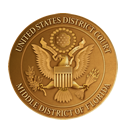Rule 34, Federal Rules of Civil Procedure, sets forth the procedures required for responding to a request for production of documents. Rule 34 also defines the term "document." In addition, the following general guidelines,
although varied to suit the needs of each case, are normally followed:
- GENERAL. The Court expects attorneys to reach agreements regarding the production of documents based upon considerations of reasonableness, convenience, and common sense.
- PLACE OF PRODUCTION. As a matter of convenience, the request may suggest production at the office of either counsel. The Court expects the attorneys to reasonably accommodate one another with respect to the place of production of documents.
- RESPONSE. An attorney should not state the documents are available for inspection and copying if they are not in fact available when this representation is made.
- MANNER OF PRODUCTION. Rule 34, Federal Rules of Civil Procedure, requires that a party producing documents for inspection produce them as they are kept in the usual course of business or organize and label them to correspond with the categories in the request. In addition, if feasible, all of the documents should be made available simultaneously, and the party inspecting can determine the desired order of review. While the inspection is in progress, the inspecting party shall have the right to review again any documents which have already been examined during the inspection.
If the documents are produced as they are kept in the usual course of business, the producing party has an obligation to explain the general scheme of record-keeping to the inspecting party. The objective is to acquaint the inspecting party generally with how and where the documents are maintained. If the documents are produced to correspond with the categories in the request, some reasonable effort should be made to identify certain groups of the produced documents with particular categories of the request or to provide some meaningful description of the documents produced. The producing party is not obligated to rearrange or reorganize the documents.
- LISTING OR MARKING. The producing party is encouraged to list or mark the documents which have been produced with unique Bates labels, hash values, control numbers, or another document identification convention. The parties are encouraged to then use Bates-labeled and numbered documents for deposition and trial exhibits. This will prevent later confusion or dispute about which documents were produced. For relatively few documents, a list prepared by the inspecting attorney (which should be exchanged with opposing counsel) may be appropriate; when more documents are involved, the inspecting attorney may want to number each document. The producing party should allow such numbering so long as marking the document does not materially interfere with its intended use. Documents that would be materially altered by marking (e.g., promissory notes) should be listed rather than marked. Alternatively, copies of the documents (rather than originals) may be marked.
- COPYING. Photocopies of the original documents are often prepared by the producing party for the inspecting party as a matter of convenience. However, the inspecting party has the right to insist on inspecting the original documents.
The photocopying of documents will generally be the responsibility of the inspecting party, but the producing party must render reasonable assistance and cooperation depending on its staffing and facilities. In a case with a manageable number of documents, the producing party should allow its personnel and its photocopying equipment to be used with the understanding that the inspecting party will pay reasonable charges. If a large quantity of documents is produced, it may be reasonable for the inspecting party to furnish personnel to make copies on the producing party's equipment or it may be reasonable for the inspecting party to furnish both the personnel and the photocopying equipment. On occasion it may be reasonable for the documents to be photocopied at another location or by an outside professional copy service.
- SCANNING. The producing party should cooperate reasonably if the inspecting party wishes to scan rather than copy documents.
- LATER INSPECTION. The inspecting party's right to inspect the documents again at a later date (after having completed the entire initial inspection) must be determined on a case-by-case basis, but permission should not be unreasonably withheld.
- OBJECTIONS. Rule 34, Federal Rules of Civil Procedure, requires that if a request for production is objectionable only in part, production should be afforded with respect to the unobjectionable portions of the request. Objections to the production of documents based on generalized claims of privilege will be rejected. A claim of privilege must be supported by a statement of particulars sufficient to enable the Court to assess its validity. For a more detailed discussion of the invocation of privilege, see Section VI of this handbook. The procedures for invoking privilege set forth in Section VI also apply to document production (which often requires the production of a "privilege log" containing the information requested in Section VI).
